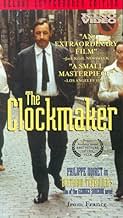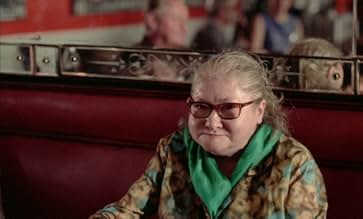IMDb RATING
7.1/10
2.9K
YOUR RATING
A Watchmaker finds out one day that his son has become a murderer. He tries to understand for whom and why.A Watchmaker finds out one day that his son has become a murderer. He tries to understand for whom and why.A Watchmaker finds out one day that his son has become a murderer. He tries to understand for whom and why.
- Awards
- 4 wins & 1 nomination total
Storyline
Did you know
- TriviaThe house where Michel meets the old lady who took care of his son is the house where Bertrand Tavernier lived his childhood with his parents during WWII. René Tavernier was a friend of Louis Aragon and Elsa Triolet.
- GoofsAt 33:08' a waiter enters the police station with a tray with four beers. Camera cuts to the adjacent office and when it returns, there are only two beer bottles left.
- Crazy creditsto Jacques Prevert
- ConnectionsEdited into Le documentaire culturel: Le siècle de Simenon (2014)
Featured review
"The Clockmaker" is a minor classic... so great, in fact, that nobody seems to know what to do with it. Why? Perhaps it doesn't fit neatly enough into the crime genre. The first shots are provocative: A child looks out from a train at a burning car. As the opening titles hit the screen, the music crescendoes. We know something bad has just happened; we brace ourselves for the violence to come. The cinematography here has the hard-hitting feel of exposé cinema (e.g., Costa-Gavras' `Z'.) As if leaving its promise unfulfilled, however, this is the film's most dramatic moment. The only violence, as it were, has occurred before the action director Bertrand Tavernier shows us. Much like its principal characters, we are left to contemplate what happened and WHY it took place.
The story is simple enough. Monsieur Decombes, a clockmaker, is interrupted at work by the local police. They inform him that his abandoned car was found by the side of the road, left there by Bernard, his son. Would he accompany them to go see it? Under this pretext, they bring him to the station, where he meets a mysteriously evasive Inspector Guilboud. They return to the vehicle together. Only then does the inspector confront him with the awful truth: Bernard and his girlfriend have killed a man. Decombes is shocked. How could his boy have done it? Throughout the rest of the film, he struggles to understand this hideous crime and his relationship with Bernard, ultimately left with more questions than answers.
Mainstream moviegoers find "The Clockmaker" boring and anticlimactic. They're used to seeing crime flicks with action and plot twists. Here, they know the identity of the murderer from the start, they never see a dead body or an exciting arrest, and 90% of the focus is on the criminal's father. What they're left with is an hour and a half of wayward wanderings... of "character development." What could be more pedestrian? One almost gets the sense that this was the very reason that Tavernier chose to bring Georges Simenon's book to the screen: It's structure is a full inversion of what audiences are used to. This is a point that deserves to be revisited later, as it has a great deal to do with the deeper meanings of this work.
While it won the Prix Louis Delluc, `The Clockmaker' has never been taken seriously by arthouse snobs either. They call its direction `heavy-handed.' They note the over-the-top performances of Philippe Noiret and Jacques Denis (not to mention Yves Afonso. runner-up to Alain Delon in the "too-cool-for-words" competition.) Oddly, they call it `commercial'... a conventional social melodrama. And while it isn't Hollywood melodrama of the Douglas Sirk or Nicholas Ray varieties, there is some validity in this assertion. The definition of `melodrama' describes the film well: `A composition. intended to exhibit a picture of human life, or to depict a series of grave or humorous actions of more than ordinary interest, tending toward some striking result.' And the point of the film is all-too-obvious: Love isn't clockwork.
I've heard `The Clockmaker' compared to many films, including those of the French New Wave that preceded it. Is there any similarity, though, between Tavernier's work and such melodramas as. say. Godard's `Vivre sa vie' or Truffaut's `The Soft Skin'? There isn't. Some have suggested that the film was the model for `The Sweet Hereafter', in that both deal with isolation and the loss of children. Yet, where Egoyan's film is politically neutral to the point of nihilism, `The Clockmaker' outlines a specific set of social conditions that made murder an inevitability. The factory watchman is the avatar for all social-climbing capitalists. abusing his authority toward lecherous ends. Liliane, Bernard's girlfriend, is the powerless victim. Whether or not Bernard pulled the trigger is immaterial. In effect, society has handed him the gun, cocked and loaded.
Personally, I find the film more similar to the work of the New German Cinema. particularly Fassbinder's `Mother Küsters Goes to Heaven.' Both films begin just after murders have been committed. Both films spotlight those who are left behind to deal with loved ones' unspeakable acts. Both films give us radicals and reactionaries, each determined to use the protagonists' woes to political advantage. Ultimately, `The Clockmaker' is the more profound work of the two. It is a true `slice of life' and not the stagy drama that `Mütter Küsters' is. Starting from a conservative stance in its opening scene, in which Decombes and his friends discuss the merits of capital punishment, it turns out to be a liberal piece. Its point, as I see it, is not merely that 'violence begets violence.' True love, in Tavernier's paradigm, comes not from hearing but from listening. not from validation but from understanding. not from making things run like clockwork but from accepting the bumps in the road as part of the journey.
The story is simple enough. Monsieur Decombes, a clockmaker, is interrupted at work by the local police. They inform him that his abandoned car was found by the side of the road, left there by Bernard, his son. Would he accompany them to go see it? Under this pretext, they bring him to the station, where he meets a mysteriously evasive Inspector Guilboud. They return to the vehicle together. Only then does the inspector confront him with the awful truth: Bernard and his girlfriend have killed a man. Decombes is shocked. How could his boy have done it? Throughout the rest of the film, he struggles to understand this hideous crime and his relationship with Bernard, ultimately left with more questions than answers.
Mainstream moviegoers find "The Clockmaker" boring and anticlimactic. They're used to seeing crime flicks with action and plot twists. Here, they know the identity of the murderer from the start, they never see a dead body or an exciting arrest, and 90% of the focus is on the criminal's father. What they're left with is an hour and a half of wayward wanderings... of "character development." What could be more pedestrian? One almost gets the sense that this was the very reason that Tavernier chose to bring Georges Simenon's book to the screen: It's structure is a full inversion of what audiences are used to. This is a point that deserves to be revisited later, as it has a great deal to do with the deeper meanings of this work.
While it won the Prix Louis Delluc, `The Clockmaker' has never been taken seriously by arthouse snobs either. They call its direction `heavy-handed.' They note the over-the-top performances of Philippe Noiret and Jacques Denis (not to mention Yves Afonso. runner-up to Alain Delon in the "too-cool-for-words" competition.) Oddly, they call it `commercial'... a conventional social melodrama. And while it isn't Hollywood melodrama of the Douglas Sirk or Nicholas Ray varieties, there is some validity in this assertion. The definition of `melodrama' describes the film well: `A composition. intended to exhibit a picture of human life, or to depict a series of grave or humorous actions of more than ordinary interest, tending toward some striking result.' And the point of the film is all-too-obvious: Love isn't clockwork.
I've heard `The Clockmaker' compared to many films, including those of the French New Wave that preceded it. Is there any similarity, though, between Tavernier's work and such melodramas as. say. Godard's `Vivre sa vie' or Truffaut's `The Soft Skin'? There isn't. Some have suggested that the film was the model for `The Sweet Hereafter', in that both deal with isolation and the loss of children. Yet, where Egoyan's film is politically neutral to the point of nihilism, `The Clockmaker' outlines a specific set of social conditions that made murder an inevitability. The factory watchman is the avatar for all social-climbing capitalists. abusing his authority toward lecherous ends. Liliane, Bernard's girlfriend, is the powerless victim. Whether or not Bernard pulled the trigger is immaterial. In effect, society has handed him the gun, cocked and loaded.
Personally, I find the film more similar to the work of the New German Cinema. particularly Fassbinder's `Mother Küsters Goes to Heaven.' Both films begin just after murders have been committed. Both films spotlight those who are left behind to deal with loved ones' unspeakable acts. Both films give us radicals and reactionaries, each determined to use the protagonists' woes to political advantage. Ultimately, `The Clockmaker' is the more profound work of the two. It is a true `slice of life' and not the stagy drama that `Mütter Küsters' is. Starting from a conservative stance in its opening scene, in which Decombes and his friends discuss the merits of capital punishment, it turns out to be a liberal piece. Its point, as I see it, is not merely that 'violence begets violence.' True love, in Tavernier's paradigm, comes not from hearing but from listening. not from validation but from understanding. not from making things run like clockwork but from accepting the bumps in the road as part of the journey.
- How long is The Clockmaker?Powered by Alexa
Details
- Release date
- Country of origin
- Language
- Also known as
- The Clockmaker of St. Paul
- Filming locations
- Production company
- See more company credits at IMDbPro
- Runtime1 hour 45 minutes
- Sound mix
- Aspect ratio
- 1.66 : 1
Contribute to this page
Suggest an edit or add missing content

Top Gap
By what name was The Watchmaker of St. Paul (1974) officially released in India in English?
Answer
![Watch Bande-annonce [OV]](https://m.media-amazon.com/images/M/MV5BZTA2YTQxYjYtNTE3NS00NTg0LWFiMjItMzgyMmZjYzdhMTJlXkEyXkFqcGdeQXRyYW5zY29kZS13b3JrZmxvdw@@._V1_QL75_UY281_CR6)




























